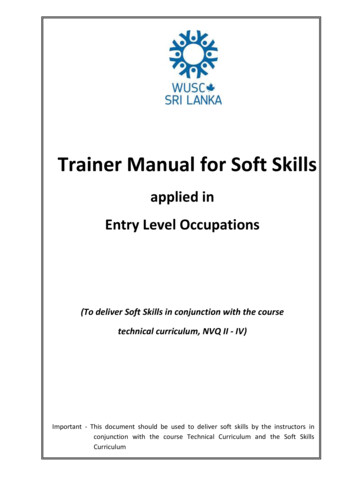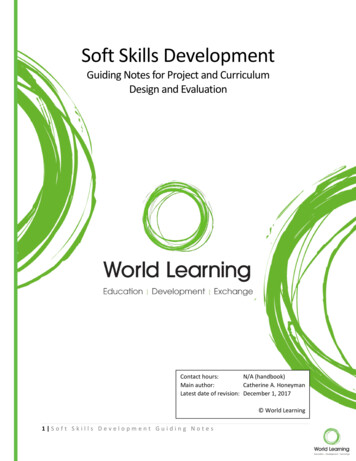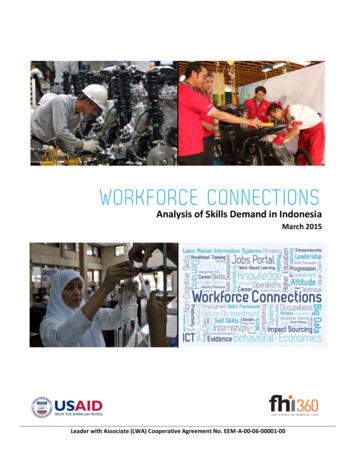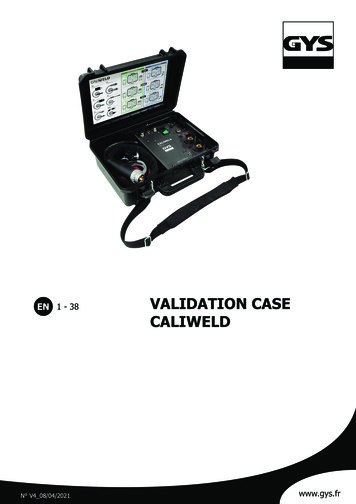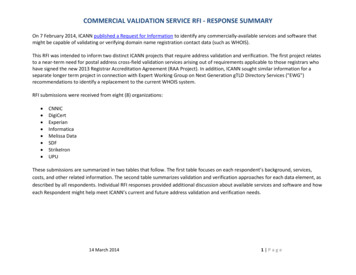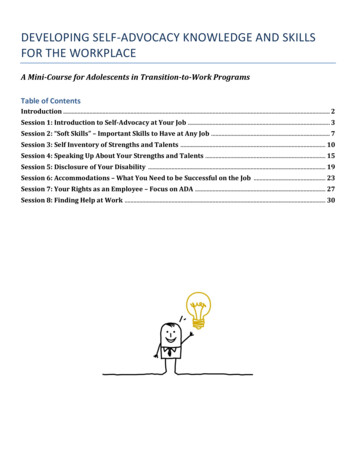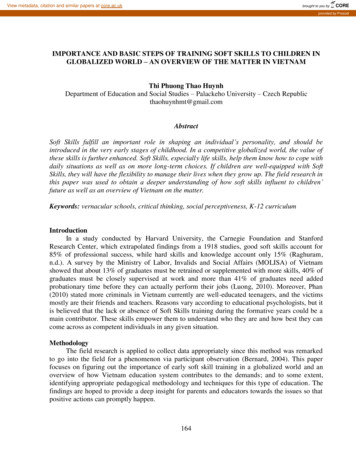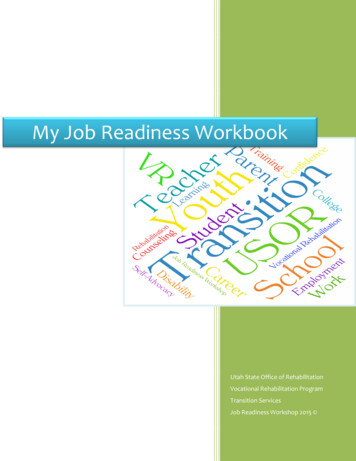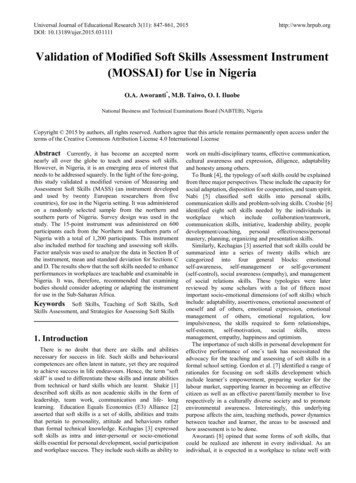
Transcription
Universal Journal of Educational Research 3(11): 847-861, 2015DOI: ation of Modified Soft Skills Assessment Instrument(MOSSAI) for Use in NigeriaO.A. Aworanti*, M.B. Taiwo, O. I. IluobeNational Business and Technical Examinations Board (NABTEB), NigeriaCopyright 2015 by authors, all rights reserved. Authors agree that this article remains permanently open access under theterms of the Creative Commons Attribution License 4.0 International LicenseAbstract Currently, it has become an accepted normnearly all over the globe to teach and assess soft skills.However, in Nigeria, it is an emerging area of interest thatneeds to be addressed squarely. In the light of the fore-going,this study validated a modified version of Measuring andAssessment Soft Skills (MASS) (an instrument developedand used by twenty European researchers from fivecountries), for use in the Nigeria setting. It was administeredon a randomly selected sample from the northern andsouthern parts of Nigeria. Survey design was used in thestudy. The 15-point instrument was administered on 600participants each from the Northern and Southern parts ofNigeria with a total of 1,200 participants. This instrumentalso included method for teaching and assessing soft skills.Factor analysis was used to analyze the data in Section B ofthe instrument, mean and standard deviation for Sections Cand D. The results show that the soft skills needed to enhanceperformances in workplaces are teachable and examinable inNigeria. It was, therefore, recommended that examiningbodies should consider adopting or adapting the instrumentfor use in the Sub-Saharan Africa.Keywords Soft Skills, Teaching of Soft Skills, SoftSkills Assessment, and Strategies for Assessing Soft Skills1. IntroductionThere is no doubt that there are skills and abilitiesnecessary for success in life. Such skills and behaviouralcompetences are often latent in nature, yet they are requiredto achieve success in life endeavours. Hence, the term “softskill” is used to differentiate these skills and innate abilitiesfrom technical or hard skills which are learnt. Shakir [1]described soft skills as non academic skills in the form ofleadership, team work, communication and life- longlearning. Education Equals Economics (E3) Alliance [2]asserted that soft skills is a set of skills, abilities and traitsthat pertain to personality, attitude and behaviours ratherthan formal technical knowledge. Kechagias [3] expressedsoft skills as intra and inter-personal or socio-emotionalskills essential for personal development, social participationand workplace success. They include such skills as ability towork on multi-disciplinary teams, effective communication,cultural awareness and expression, diligence, adaptabilityand honesty among others.To Bunk [4], the typology of soft skills could be explainedfrom three major perspectives. These include the capacity forsocial adaptation, disposition for cooperation, and team spirit.Nabi [5] classified soft skills into personal skills,communication skills and problem-solving skills. Crosbie [6]identified eight soft skills needed by the individuals unication skills, initiative, leadership ability, peopledevelopment/coaching, personal effectiveness/personalmastery, planning, organizing and presentation skills.Similarly, Kechagias [3] asserted that soft skills could besummarized into a series of twenty skills which arecategorized into four general blocks: emotionalself-awareness, self-management or self-government(self-control), social awareness (empathy), and managementof social relations skills. These typologies were laterreviewed by some scholars with a list of fifteen mostimportant socio-emotional dimensions (of soft skills) whichinclude: adaptability, assertiveness, emotional assessment ofoneself and of others, emotional expression, emotionalmanagement of others, emotional regulation, lowimpulsiveness, the skills required to form ills,stressmanagement, empathy, happiness and optimism.The importance of such skills in personal development foreffective performance of one’s task has necessitated theadvocacy for the teaching and assessing of soft skills in aformal school setting. Gordon et al. [7] identified a range ofrationales for focusing on soft skills development whichinclude learner’s empowerment, preparing worker for thelabour market, supporting learner in becoming an effectivecitizen as well as an effective parent/family member to liverespectively in a culturally diverse society and to promoteenvironmental awareness. Interestingly, this underlyingpurpose affects the aim, teaching methods, power dynamicsbetween teacher and learner, the areas to be assessed andhow assessment is to be done.Aworanti [8] opined that some forms of soft skills, thatcould be realized are inherent in every individual. As anindividual, it is expected in a workplace to relate well with
848Validation of Modified Soft Skills Assessment Instrument (MOSSAI) for Use in Nigeriaothers, be passionate to encourage others and handle variouschallenges. No wonder a lot of companies today do not onlyassess their current staff and future recruits on their businessskills but are more interested in assessing them on thevarious aspects of soft skill competencies with a view toknowing the extent they relate and communicate with others.Incorporating soft skills into the school system, Lee et al [9]opined that the teacher needed to create a positive culturethat would encourage students’ learning achievement. Suchclassroom culture should be geared towards generatingstudents’ friendly relationships, appreciating students'achievements, creating interesting learning experiences anddeveloping leadership and sense of duty among othersKechagias [3] identified two different schools of thoughtin the teaching of soft skills. These are the ‘generalists’ andthe ‘specifists’. To the generalists, soft skills are seen asgeneric which can be taught separately from content andapplied to any discipline. However the specifists believedthat soft skills could not be taught as one-shot inoculation ofskill development but to be embedded in each course orsubject since knowledge is fundamentally situated. Inconsonance with these approaches, twenty Europeanresearchers (3 from UK, 5 from Greece, 4 from Sweden, 3from Romania and 5 from Netherlands) described theteaching approaches as “Autonomous Teaching” or“Stand-Alone Approach” and “Intermixed Teaching” or“Embedded Approach”.A fifteen-item soft skills assessment instrument wasdeveloped by these twenty European researchers which laterformed the basis for the assessment of soft skills in Europe.The fifteen-item soft skills assessment include: manners,ownership of tasks, attendance, motivation, professionalism,work output, conduct in workplace, time keeping, ing/respect, helping others, conscientiousness, ability toask for help and adaptability/flexibility. It is obvious thatwhat works in one place may not necessarily work in another,perhaps as a result of socio-cultural differences. Thisinvariably, calls for adaptation, so that such thing can alsowork in a different setting, hence, the need of revalidation ofinstrument for use in Nigeria.Research QuestionsTo address the problem identified on MASS by someAfrican educational researchers, the following two questionshave been raised for this study:1. What is the exploratory factor model of the ModifiedAssessment of Soft Skills Instrument (MOSSAI)?2. Is the Modified Soft Skills Assessment Instrument(MOSSAI) adaptable to the teaching and assessmentmethods used in Nigerian Schools?Statement of ProblemThe statistics employed for analysis of the data obtainedfrom Section B of the instrument was Exploratory FactorAnalysis (EFA) for validity coupled with Cronbach Alphafor reliability. The initial reliability of the 63 variables was0.968 which underwent factor analysis process withorthogonal rotation to produce 5-factor model of 50 contentareas for final version (See Appendix III for details) Thereliability of the final version was 0.961.The names given tothe subscales of the 5-factor model with their reliabilitycoefficients are commitment to duty (0.908), attending toresponsibilities (0.925), adaptability (0.901), resourcesmanagement skills (0.801) and motivation (0.791). ForSections C and D of the MOSSAI, mean and standarddeviation were used to analyze the responses of therespondents. Data from a mean of 2.5 and above wereaccepted while others below 2.5 were rejected.Despite the popularity of teaching and assessment of softskills in the Western world, the integration of the concept ofsoft skills in African school setting is yet to be fullyembraced. Some African scholars see soft skills as beinginnate to be taught and examined while others believed theyare teachable but not examinable. Another impediment to theformalization of socio-emotional skills education is gettingappropriate methods for the teaching and assessment of softskills. This paper is aimed at seeking the stakeholders’ viewson the appropriate methods for teaching and assessing softskills in Nigerian educational system. This paper, therefore,validated a modification of the instrument developed by theEuropean researchers for the measuring and assessment ofsoft skills (MASS) in Europe and also investigated itsusability in the Nigerian context.2. MethodologyThe study was designed as a survey. The population of thestudy was made up of teaching personnel from both theprivate and public schools registered by the NationalBusiness and Technical Examinations Board (NABTEB),Nigeria. Multi-stage sampling technique was adopted inselecting 1,200 respondents for this study. Out of sixgeo-political zones in Nigeria, four were randomly selectedthat is, two geopolitical zones each from northern andsouthern parts. Two states were randomly selected from eachof the four geopolitical zones. In each of the states, sixschools of both public and private were randomly selectedwith 25 participants each. Thus, a total of forty-eight schoolswere used comprising thirty–five (35) technical schools(public) and thirteen (13) private schools with 825 and 375participants respectively. Thus, there were 683 male teachersand 517 female teachers’ altogether.InstrumentationBased on the 15-point Measuring and Assessment of SoftSkills (MASS) designed which formed the basis of the study(Appendix I for details), the researchers drafted 63 variablesto form the Modified Soft Skills Assessment Instrument(MOSSAI) for the use in Nigeria (See appendix II for details).Section A of the MOSSAI has to do with personal data of therespondents in terms of name of school and gender. The 63variables formed Section B of the new instrument for thisstudy while Sections C and D focused on methods ofteaching and assessing soft skills.Analysis Procedure
Universal Journal of Educational Research 3(11): 847-861, 20158493. Results and FindingsResearch Question 1What is the exploratory factor model of the Modified Soft Skills Assessment Instrument (MOSSAI)?Table 50var51Table Showing the Communalities of the Extracted .538.517.554.555.466.531.526.599
850Validation of Modified Soft Skills Assessment Instrument (MOSSAI) for Use in 0.614.555.907Table 1b. Kaiser-Meyer-Olkin (KMO) and Bartlet's TestKaiser-Meyer-Olkin Measure of Sampling Adequacy.Bartlett's Test of Sphericity.965Approx. Chi-Square40692.753Df1953Sig.000Table 1c. Total Variance 2Initial Eigenvalues% 85.746.75386.499.74987.248Extraction Sums of Squared Loadings% tation Sums of Squared Loadings% ofCummulative 8.4711.3322.11450.585.6741.07051.655Total
Universal Journal of Educational Research 3(11): 847-861, 3100.000Extraction Method: Maximum LikelihoodScree Plot2520Eigenvalue1510501 3 5 7 9 11 13 15 17 19 21 23 25 27 29 31 33 35 37 39 41 43 45 47 49 51 53 55 57 59 61 63Factor NumberFigure 1. The Scree Plot
852Validation of Modified Soft Skills Assessment Instrument (MOSSAI) for Use in NigeriaTable 1d. Table Showing the Rotated Factor r53Extraction Method: Maximum Likelihooda. Rotation Converged in 8 n Method: Varimax with Kaiser Normalization.768.746.544.52011
Universal Journal of Educational Research 3(11): 847-861, 2015853Table 1e. Table showing factor loading for rotated factors, eigenvalues and percentage of the five-factor model in new MOSSAIItem NoFactor123Final Communality 6Eigenvalues21.4163.2342.5251.6491.564Percentage of variance33.9945.1334.0082.6172.483
854Validation of Modified Soft Skills Assessment Instrument (MOSSAI) for Use in NigeriaTable (1a) presents the Table of Communalities beforeand after extraction which indicates how much variance ineach variable of this study is explained by the analysis. Table(1b) shows Kaiser-Meyer-Olkin (KMO) Measure ofSampling Adequacy. As a measure of factorability, the KMOis 0.965. The Bartlett’s Test of Sphericity indicates that thedata is probably factorable and it is significant (p .05).Table (1c) depicts the total variance for factor solution inthis study. The table presents the eigenvalues beforeextraction and after rotation to have sums of squaredloadings and rotation sums of squared loadings respectively.In this study, the first eleven factors with eigenvalues isgreater than 1 accounted for 51.7%. Figure (1) presents theScree Plot which is the graph of how the eigenvaluescoordinates with the factors. Table (1d) shows rotated factormatrix while Table (1e) presents factor loading for rotatedfactors, eigenvalues and percentage of the five-factor modelin the new instrument (MOSSAI).4. DiscussionHaving considered the basic steps for retaining the reliablefactors by means of eigenvalues, amount of total variance,scree plot, residuals and assessment of model fit in theModified Soft Skills Assessment Instrument (MOSSAI), 11variables have eigenvalues that exceeded the criterion valueof 1.00. The feasibility of at least 70% of the total variabilitywas not attained due to the sample size. However, the totalvariance accounted for was 51.7%. The Scree Plot at itssharp bent in relation to eigenvalues produced was inspected;the rotated factor matrix yielded a 5-factor result. As afunction of factor analysis, the correlation coefficientbetween observed and reproduced coefficients determinesthe residual for achieving the fit of the model created by thefactors. Due to the enlargement of the table of reproducedcoefficient, the footnote produced by SPSS package showsthat there are 48 (2.0%) non-redundant residuals withabsolute values greater than 0.05. By implication, the modelfor this study has a good fit. The steps for retaining reliablefactors validate Kerlinger et al. [10] and Mertler et al. [11]which stated that only those components (factors) whoseeigenvalues are greater than 1 should be retained; theyexplained further that amount of total variance, the scree plotas well as residual for achieving the model fit are part of theessential factors for consideration.The identified 5-factor in this study has been interpreted ascommitment to duty, attending to responsibilities,adaptability, resources management skills and motivation forclarity and proper identification purposes.Research Question 2Is the Modified Soft Skills Assessment Instrument(MOSSAI) adaptable to the teaching and assessmentmethods used in Nigerian Schools?Table 2a. Mean rating and standard deviation of methods of teaching soft skillsS/N1.2.3.4.5.6.7.8.9.10.11.12.13.14.METHODS OF TEACHING SOFT SKILLSDirect instructionDemonstration methodLecture methodDiscussion methodSimulation methodRote memorizationSelf discovery methodQuestioning methodInterviewing methodProject approachMapping methodCooperative learningReflectionPictorial 2.112.542.512.38STANDARD ejectTable 2b. Mean rating and standard deviation of methods of assessing soft skillsS/N1.2.3.4.5.6.7.8,9.10.11.METHODS OF ASSESSING SOFT SKILLSObjective testsEssay testsPractical testsSpeed testsChecklistsQuestionnairesInterviewsRating 52.592.102.512.532.252.522.552.042.47STANDARD tAcceptAcceptRejectAccept
Universal Journal of Educational Research 3(11): 847-861, 2015Table (2a) overleaf depicts the responses of therespondents toward appropriate methods of teaching softskills in the new instrument. Out of the fourteen perceivedmethods, only ten were approved by the respondents for thisstudy. In terms of rating, the highest rated method ofteaching is the discussion method with a mean of 2.71 andstandard deviation of 0.699 while the least rated one is thesimulation method which has a mean of 2.50 and standarddeviation of 0.625. From Table (2b), out of eleven perceivedmethods of assessing soft skills, eight were accepted.Practical tests is the most rated assessment method with amean of 2.59 and standard deviation of 0.598 while the leastrated is assignment with a mean of 2.47 and standarddeviation of 0.644.The findings revealed agreement among respondents oncertain appropriate teaching and assessment methods for softskills in the new instrument. Such teaching methods include:discussion, demonstration, interviewing, direct instruction,self discovery, project approach, cooperative learning,questioning, reflection and simulation. To encourage latenttraits in an individual for achieving success in life, soft skillsrequire different teaching methods for self-awareness.In the same vein, assessment methods favoured arepractical tests, essay tests, observations, objective tests,questionnaires, rating scales, checklists, and assignments.These assessment methods agree with the studies of Curtis[12] and Kechagias [3] who categorize soft skills assessmentmethods into standardized assessment (multiple-choice orshort-structured items provided for examinees’ responses),common assessment tasks (where tasks designed to provideopportunities for examinees to demonstrate and/or developconstructs intended to be assessed), performanceassessments types of testing that call for demonstration ofunderstanding and skill in applied, procedural or open-endedsettings), teacher/holistic judgment (where thorough,frequent and close observation of the teacher or supervisor isrequired) and portfolio assessment (where individualexaminee is made to select and aggregate the evidence of hisown achievement of particular skills).8555. ConclusionsIn this paper, efforts have been made to examine theteachability and examinability of modified soft skills inNigeria. The results in this study have shown that out of thefifteen identified soft skills by the five European countries,only five are suitable to be taught and examined in Nigeriancontext. These include commitment to duty, attending toresponsibilities, adaptability, resources management skillsand motivation. The study was able to identify fifty contentareas that could be taught under the five concepts.Based on the findings, the five soft skills have been proventeachable using such methods like direct instruction,demonstration, discussion, simulation, self discovery,questioning, interviewing, project, cooperative learning andreflection methods. In the same manner, the study revealedthat the five-factor already identified can be examined usingobjective tests, essay tests, practical tests, checklists,questionnaires, rating scales, observations and assignments.Other methods including speed tests, interviews andportfolios are inappropriate and unsuitable for theexamination of soft skills in Nigerian school system.6. RecommendationsThe design and development of Modified Soft SkillsAssessment Instrument (MOSSAI) materials on the fiveteachable and examinable areas are recommended to begiven a considerable attention while the NigerianEducational Research and Development Council (NERDC)should design curriculum for the soft skills as a subjectcovering the fifty content areas identified in this study.Policy makers, school authorities, teachers, stakeholders andthe general public should be sensitized on the need tocommence teaching and assessing of soft skills in oureducational system. Examination bodies in Africa shouldstart thinking of examining/assessing soft skills as part oftheir examinable subjects. To reduce security threats andstop unnecessary killings in our continent, there is need forthe introduction of soft skills in the primary, secondary andtertiary institutions. Following these arrangements, Nigeriaand indeed other countries in Sub-Sahara Africa areencouraged to introduce soft skills in their teachingcurricular.
856Validation of Modified Soft Skills Assessment Instrument (MOSSAI) for Use in NigeriaAppendix I: Soft Skills Included in the Assessment of Soft Skills (Mass) Materialsby 20 Europeans ResearchersSoft SkillOther words that mean the same thingMannersPoliteness, consideration, courtesyOwnership of tasksResponsibility, duty, dependabilityAttendanceTurning up, coming in, appearingMotivationIncentive, inspiration, drive, impulseProfessionalismCompetent, skilful, dedicatedWork outputActivity, productivity, productionConduct in workplaceBehaviour, attitude, maturityTimekeepingOn time, not lateVerbal CommunicationTalking, Consulting, meetings, discussingOrganisation/ planningPreparation, scheduling, arrangingTeam-working/ RespectEsteem, valuing others, helping others,considerationHelping othersSupporting, offering, trainingConscientiousnessCareful, meticulous, thorough, hard workingAbility to askfor helpAdmitting own limitations, confidence, courageAdaptability/ FlexibilityCompliance, accepting changeExamples of when this soft skill is usedSaying thank you, holding doors open for others, askingpermission to do things etcMaking sure tasks are done properly, turning up on time formeetings, working in partnership with others and doing yourrole so they can do theirs etcArriving on time for meetings and for work. Making sure youkeep people informed regarding your attendance or availability.Taking on new challenges, working hard to achieve goals,thinking of new ways to do thingsWorking to a high standard, being consistent in attitude (notallowing emotions or personalities to influence you)Meeting deadlines and standards for work. Producing productsto target.Respecting others, not playing games when you should beworking etcArriving for work or meetings on time, leaving at the right timeUsing the right tone of voice and words when speaking withcolleagues etcHaving all required resources to hand, thinking jobs through,arriving on time, meeting deadlines etcWorking well together on a task, making best use of your skillsand the skills of others. Acknowledge the status of others andact accordinglyGiving up some of your time to support those who arestruggling or need help to meet a deadlinePaying attention to detail, accurate work, making sure you dowhat you are paid to doAsking colleagues to show you how to do something or to helpyou complete a task on time etcTaking on new challenges, accepting changes to rules andconditions, staying late to finish urgent tasks etcSource: Culled from teaching and assessing soft skills by K. Kechagias (2011) pages 83 andAppendix II: Original DraftNational Business and Technical Examinations Board (Nabteb) Benin CityDear Respondent,This instrument is designed to elicit relevant information from you on “Validation of Modified Soft Skills AssessmentInstrument (MOSSAI) for use in Nigeria. The essence is to provide useful information for decision making on inclusion ofsoft skills in the school curriculum. The instrument is purely for academic purposes. Please note that your responses wouldbe treated with utmost confidentiality. Thanking you in anticipation for your favourable response.Section A (Personal Profile)Please respond by placing a tick (1. Name of School2. Type of School: Public3. Gender Male) where appropriate.PrivateFemaleSection BBelow are statements that address some selected soft skills which you are to respond to in the form of rating scale withVery Teachable (VT), Teachable (T), Fairly Teachable (FT) and Not Teachable (NT). Please read carefully each of theunder-listed statements and respond by placing a tick ( ) that best suits each of the statement along the continuum.
Universal Journal of Educational Research 3(11): 847-861, 51.52.53.54.55.56.57.58.59.6061.62.63.SOFT SKILLSReadily accepting responsibilitiesZealous in performing one’s dutiesCreativity on the jobDelegating duties to right personsDiligence in supervisionPunctuality at workEnthusiasm at workMoral integrity on the jobDevotion to dutyEager to learnGoals settingJob securityJob enlargementJob rotationReinforcementMastery of job contentSOFT SKILLSBeing readily available at workEfficiencyEffectivenessTime managementGood work ethicsObservance of school rules and regulationsLoyalty to dutyPatience at workContentmentSpeaking skillReading skillWriting skillBody languageQuantity of resourcesQuality of resourcesAllocation of uationFeedbackToleranceCooperationLeadership styleFollowership traitsAdministrative supportOperational supportOn the job trainingMentoringProviding feedbackInsightfulnessAbility to RecallTurn challenges to opportunitiesTurn weaknesses to strengthSeek for improved knowledgeSeek for advicePolite requestsConfidence in the ability of othersEmbracing changesObservance of ser goalsObservance of new rules and regulations at workplaceEmbracing new knowledgePerseveranceFact findingCarefulnessDiligenceAdmitting one’s own limitations857VTTFNTVTTFNT
858Validation of Modified Soft Skills Assessment Instrument (MOSSAI) for Use in NigeriaSection CSuggested below are methods of teaching the above selected soft skills. Please indicate in the form of Very appropriate(VA), Appropriate (A), Not Appropriate (NA).S/N1.2.3.4.5.6.7.8.9.10.11.12.13.14.SUGGESTED METHODS OF TEACHING SOFT SKILLSDirect instructionDemonstration methodLecture methodSimulation methodDiscussion methodRote memorizationSelf discovery methodQuestioning methodInterviewing methodProject methodMapping methodCooperative learningReflectionPictorial methodVAANASection DRead carefully the suggested assessment methods by which the above se
A fifteen-item soft skills assessment instrument was developed by these twenty European researchers which later formed the basis for the assessment of soft skills in Europe. The fifteen -item soft skills assessment include: manners, ownership of tasks, attendance, motivation, professionalism
